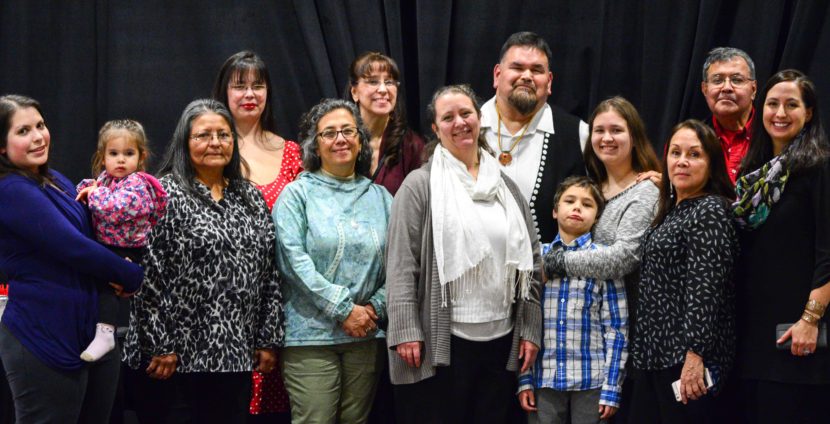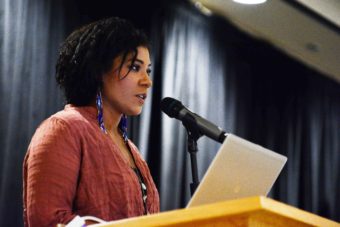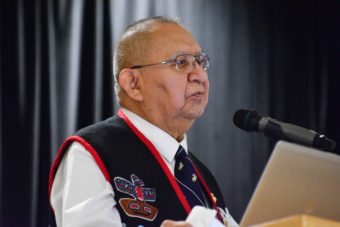
What makes a modern warrior?
According to Southeast Alaska’s largest tribal organization, a warrior is someone who fights to preserve subsistence rights or Native languages. It’s also someone who works for clean water or cares for other people’s children.
Four people or families were named as modern warriors by the Central Council of Tlingit and Haida Indian Tribes of Alaska during a Nov. 22 Native American Heritage Month Celebration in Juneau.
Organizers said those recognized represented many other tribal citizens who also go above and beyond to advocate, protest and protect.
Alfie Price co-leads a Tsimshian language practice group in Juneau. He’s also learning the Tlingit and Haida languages. But when he accepted an award naming him a Warrior for Protecting our Languages, he spoke in Eyak, a Prince William Sound Native language that’s considered extinct.
“I just wanted this room full of people to hear a few words of Eyak tonight,” Price said.
Price, who also is Tlingit, talked about the process of learning the language of his Tsimshian ancestors.
“An unexpected side effect of learning Sm’algyax especially is I feel my own healing,” Price said. “The hurts and the things that made me bitter in my life are falling away. They’re becoming light on my shoulders.”

At the ceremony, Miciana Hutcherson was named Warrior for Protecting Our Sacred Lands and Waters.
Hutcherson is an activist who joined the Standing Rock Sioux protesting construction of the Dakota Access Pipeline. She said the campaign’s motto, “Water is Life,” is also important in her Tlingit homeland.
That includes protecting trans-boundary rivers from industrial development on the Canadian side of the border.
“We’re standing up for our inherent rights in a way that we’ve never seen before,” Hutcherson said. “We’re giving our kids and future generations something to be proud of and ensuring that we’ll leave something behind tangible for them to hold onto and that’s each other.”
Also honored was Harold Martin, who was named Warrior for Protecting Our Traditional Harvesting Rights.

The longtime central council subsistence director led numerous efforts to continue or preserve traditional harvests of seals, otters and other marine life.
Martin, a former logger, stressed the importance of secondary schooling.
“Education opens all kinds of doors. It’s never too late to go back to school,” Martin said. “I was 40 years old when we decided to go back to school in 1974. And I was able to go to work and still retire.”
Veronica and Mike Hoyle were named Warriors for Caring for Our Children.
Surrounded by his large family, Mike Hoyle talked about fostering kids and taking responsibility to raise them.
“We never had any thoughts of adopting,” Hoyle said. “We just wanted to do the right thing, when people need a place to sleep. You just look out for your family.”
Watch the celebration program, which begins about 48 minutes into the video:
Ed Schoenfeld is Regional News Director for CoastAlaska, a consortium of public radio stations in Ketchikan, Juneau, Sitka, Petersburg and Wrangell.
He primarily covers Southeast Alaska regional topics, including the state ferry system, transboundary mining, the Tongass National Forest and Native corporations and issues.
He has also worked as a manager, editor and reporter for the Juneau Empire newspaper and Juneau public radio station KTOO. He’s also reported for commercial station KINY in Juneau and public stations KPFA in Berkley, WYSO in Yellow Springs, Ohio, and WUHY in Philadelphia. He’s lived in Alaska since 1979 and is a contributor to Alaska Public Radio Network newscasts, the Northwest (Public Radio) News Network and National Native News. He is a board member of the Alaska Press Club. Originally from Cleveland, Ohio, he lives in Douglas.




